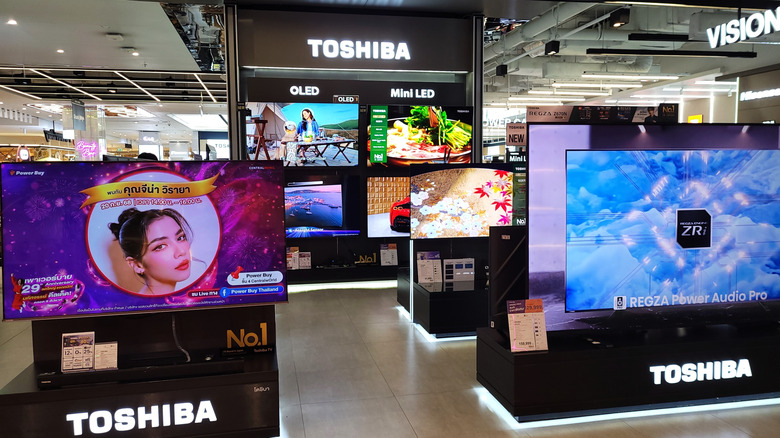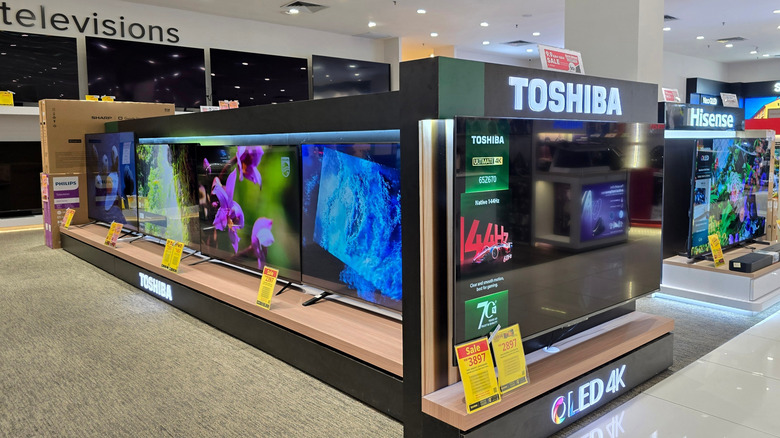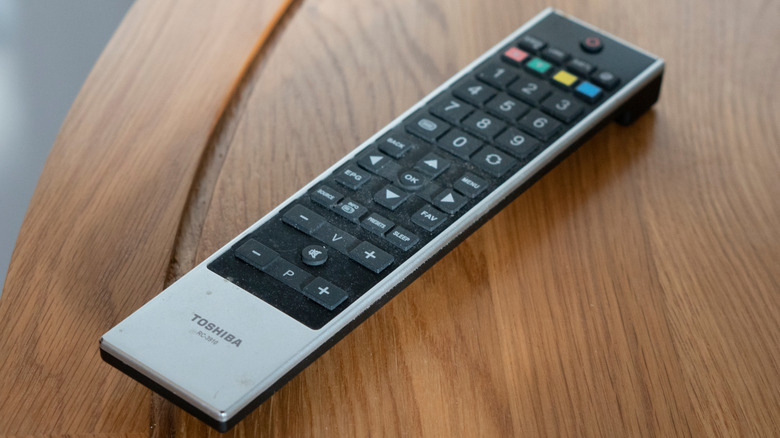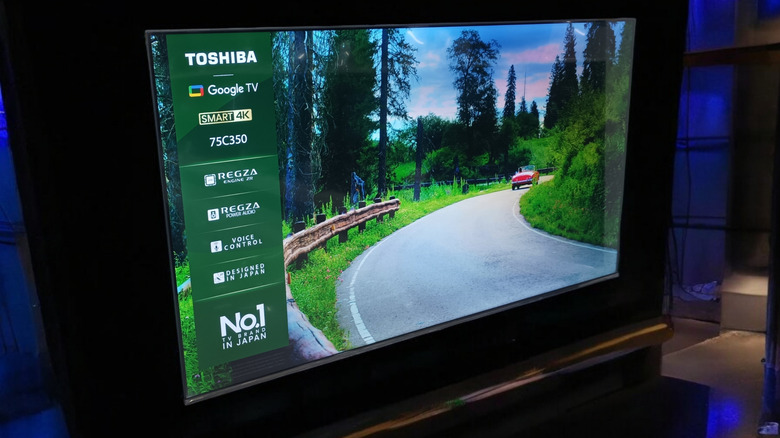Is Toshiba A Good TV Brand? Here's What Reviews Say
The name Toshiba has a nostalgic ring to it, which is unsurprising for a brand that was once a heavyweight in the CRT and early LCD era. These days, however, it doesn't quite live up to the "heavyweight" status, but remains more of a quiet competitor in a market currently dominated by OLED and Mini LED giants. Don't mistake that quietness for irrelevance, though.
The fact that Toshiba is still in the electronics business in 2025 means it's playing by a whole different set of rules. Rather than flexing cutting-edge specs like SONY, LG, and their peers, the Japanese company leans more on affordability and practicality, capturing a solid market share of buyers who value exactly that. Still, plenty of shoppers wonder: Is Toshiba a good TV brand in 2025?
Well, here's an answer you've probably heard before — it depends. "Good" is subjective, after all. If all you want is to spend your evenings binging Netflix comedies, watching live sports, or playing video games on a budget, Toshiba might actually surprise you. On the other hand, if you want the ultimate home-cinema-level blacks or HDR that knocks you back in your seat, the answer isn't as straightforward. And that right there is the tricky middle ground that modern Toshiba TVs find themselves in; solid value and decent variation depending on the model and market, but with a few rough edges, which, for the most part, narrow down to the brand's evolution over the years.
What the reviews say: the good
One trend emerges from reading the reviews, and it's that Toshiba TVs, more often than not, prove to be better than they ought to be for the price. That's not hyperbole; rather, it's the consensus of reviewers who went in with low or modest expectations and ended up pleasantly surprised. RTINGS' testing of the C350 Series in 2023 commended the TV's viewing angles and reflection resistance, which matter to most people — especially those in shared living rooms — than some might think. Motion performance is not great, but pretty decent, meaning sports and fast-paced games remain clear even on the less expensive panels. And given how motion blur can ruin a big-screen experience, that's not nothing.
Then there are the standard features, such as fast app loading, smooth setup, and respectable smart-TV integration. In its own words, What Hi-Fi? described the Toshiba 24WK3C63DB in a review as good value and claimed to like the simplicity of the brand's OS. In fact, a few models like the QA5D even take things next level by having quantum-dot color systems, which were once only seen in pricier displays. Because of this, Toshiba's midrange sets can be more vibrant and punchier than you'd expect in this tier, something that catches most buyers by surprise. For users who are mostly streaming TV shows, watching sports, light gaming, or just watching casual YouTube content, then Toshiba is the "good enough," affordable TV that quietly exceeds expectations.
The bad and final verdict
There is, of course, more to this tale, which explains why Toshiba barely cuts it for "best TV of the year." Reality sets in when talking about picture quality, especially in dimly lit areas. "Terrible contrast and sub-par black uniformity" is how RTINGS described it, and it's safe to say that this is where most Toshiba TVs fall short. Black turns gray, shadow detail disappears, and HDR movies don't quite have their usual punch. Even Expert Reviews seconded this in their Toshiba UK4D review, claiming the TV "offers decent features at an affordable price but is let down by its picture quality."
Additionally, software can also be hit-or-miss with Toshiba TVs. Frustrated owners on Consumer Affairs complain about unresponsive remote controls, sluggish menus, firmware bugs, and other issues. Trustpilot reviewers also aired similar complaints, with some even griping about inconsistent support. This places Toshiba in a familiar position — good for casual viewing with reliable 4K streaming, solid color accuracy, smart-TV integration, among other basic features.
Even so, home-cinema buffs, who still care about cinematic contrast, deep blacks, premium HDR, and anything else high-end, might want to sit this one out and upgrade hundreds, if not thousands of dollars, for Toshiba's premium sets like the X9900L OLED 4K and Z870 Mini LED categories. The other option is to switch to a different brand, like LG or Samsung altogether. As for the final verdict: Yes, Toshiba is a good TV brand for most people, but not a great one.
How we evaluated Toshiba TVs
To pinpoint exactly where Toshiba really stands, we used data from a pool of lab tests, expert reviews, and real-world feedback on the Toshiba TV experience. First up was RTINGS.com, which we can describe as impartial as TV testing gets. In its in-depth review of the 2023 Toshiba C350 Series, they paint quite a clear picture — decent viewing angles and reflection handling, good motion response, but with weak contrast and low brightness. While they described it as perfectly fine for watching sports and TV shows, they still called it "a mediocre TV overall."
We then looked at What Hi-Fi?, a publication that's more like the "Rotten Tomatoes" of reviewing TV sets, and almost never one to go easy on budget options. Surprisingly, even they had kind words for Toshiba's latest 50UK4D63DB, calling it "way more enjoyable to watch than it has any right to be." Still chasing after more insight, we also looked through hundreds of owner reviews and ratings on ConsumerAffairs, where praise for affordability and ease of setup coexists with complaints about inconsistent quality and software issues.
Finally, we also found it fit to factor in brand structure, which includes where Toshiba's TVs are actually built and sold. Many Toshiba TVs in North America run Amazon's Fire TV interface. In Europe, on the contrary, Toshiba's TVs rolling out of Vestel's production lines use Android TV instead. The result? Two Toshiba TVs that share the same model number, but still feel surprisingly different depending on where you buy them — pretty much different panels, different software, and sometimes even different picture quality. Quite paradoxical, right?



